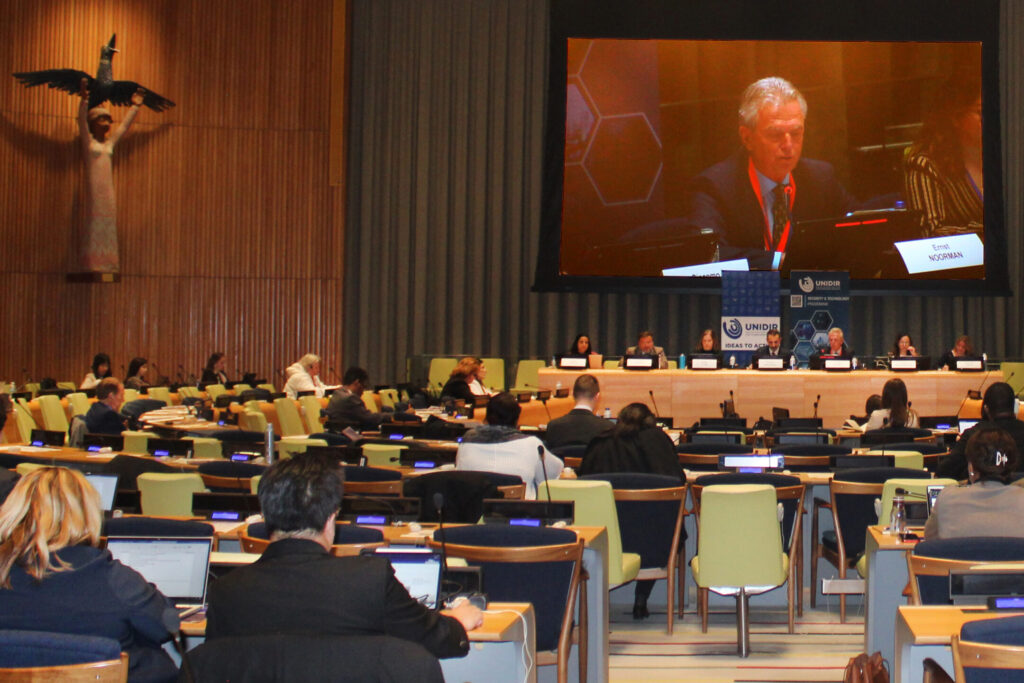The 11th edition of the Cyber Stability Conference, a flagship event of UNIDIR, brought together 31 speakers and over 400 participants at the United Nations Headquarters in New York and online. The conference focused on cyber threats to international peace and security. Spanning two days, from 29 February to 1 March 2024, the conference covered a wide range of topics. These included the evolving threat landscape due to artificial intelligence (AI), the complexity of threat actors, and their impact on the implementation of responsible state behaviour in cyberspace.
The cyber threats landscape is increasingly complex and challenging to navigate. Emerging technologies, such as AI and quantum computing, have the potential to create new threats or enhance existing ones by improving their accuracy, frequency, scale, and effect, while also making them more difficult to detect and counter.
As Ms. Izumi Nakamitsu, High Representative for Disarmament Affairs highlighted in her opening speech, “Lightspeed advances in technology are creating new vectors for exploitation and revealing novel vulnerabilities.” (The full speech is available here.)
The topic of threats has also gained increased traction in multilateral discussions concerning ICT and international peace and security. In 2023, over 100 interventions by states and the multistakeholder community were made on the subject of threats within the context of the Open-Ended Working Group on the security of and in the use of information and communications technologies 2021-2025 (OEWG on ICTs).
As highlighted by Ambassador Burhan Gafoor, Chair of the OEWG on ICTs, “(…) building a common understanding of the threat landscape is an important and essential starting point for the work on ICT security because a clear understanding of the threats that we face as a global community provides the foundation for action, it provides the foundation to discuss cooperative measures that we should all take as the international community and a discussion on the threat landscape also provides the context for discussions and actions on the other aspects of the mandate of the OEWG.”
Tying into the need for a better understanding of the issues at hand, UNIDIR Director Robin Geiss, said “UNIDIR has developed a range of tools to help states and other stakeholders better understand the fast-evolving cyber threat landscape, including our Cyber Policy Portal, a taxonomy of malicious ICT incidents and our ongoing research on mapping of AI risks in the cyber domain.”

The conference emphasized the increasing complexity of the cyber threat landscape, propelled by technological advancements in AI and quantum computing. It underscored the dual-use nature of AI and the necessity of adapting to the evolving threat environment, the diversification of threat actors, and the increased risks to critical infrastructure.
“Rules, norms, and principles must transcend specific technologies, remaining agnostic to potential threats. In this realm, nearly all technologies are dual-use. The focus should be on banning malicious applications, not the technology itself. Continuous adaptation is crucial in the ever-evolving tech landscape, ensuring that new innovations foster a safer, secure, and prosperous future. International collaboration is key to navigating the opportunities and challenges presented by emerging technologies”, said Ramy Reda, Advisor, Cabinet of the Minister of Foreign Affairs of Egypt
The conference also highlighted the need for a comprehensive approach that includes international cooperation and multi-stakeholder involvement.
“In parallel to the evolution of the threat actor landscape, we’ve also seen that the cyber defence ecosystem is evolving and now encompasses private companies and some non-State actors. This significant evolution over the last four years gives hope for a better, multistakeholder framework to ensure the global stability of cyberspace”, said Jérôme Barbier, Head of Outer Space, Digital, Economic Issues, Paris Peace Forum
The conference preceded the 7th substantive session of the OEWG, held from 4 to 8 March 2024. During this session, the agenda item on existing and potential threats attracted the most attention, with states making a total of 57 interventions. This made it the most discussed topic of the 7th OEWG session.
The UNIDIR Cyber Stability Conference is an annual flagship event of its Security & Technology Programme, supported in its 2024 edition by the Governments of France, Germany, Italy, the Netherlands, Norway, Switzerland, and Microsoft. For more information about the work of the Security & Technology Programme, visit: Security and Technology → UNIDIR.
